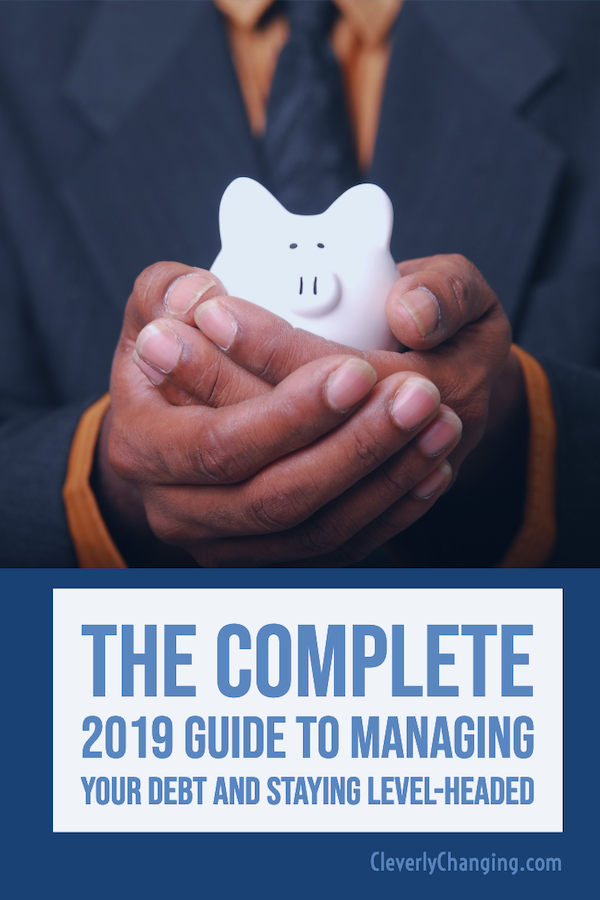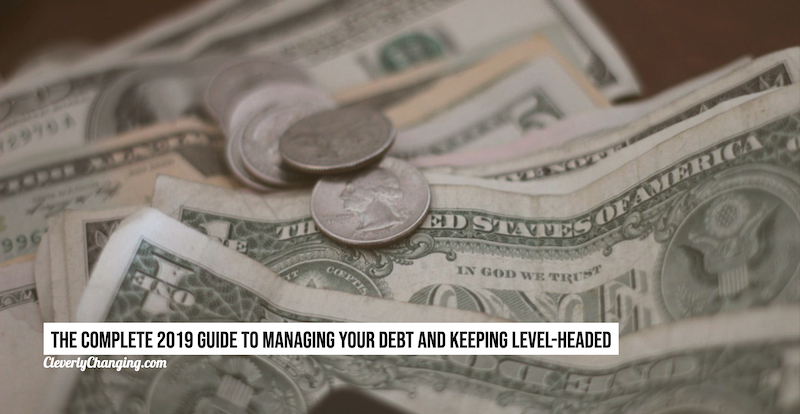No matter how much debt you may have, it still needs to be managed. This can be done by making sure your payments are on time. This can be difficult for a lot of us for a number of reasons. Today we’re going to give you the complete 2019 guide to managing your debt while still keeping a level-head. Debt can be incredibly stressful and this guide will help alleviate that while getting your finances on track! Let’s get into it.
Know What You Owe
Knowing who you owe and how much you owe is a great first step to dealing with your debt. This can be done by making a list of the companies you owe money to followed by a list of the total amount owed.
Doing this can make debt feel a bit smaller and easier to manage. This can be the starting point of checking companies off that list and making your debt amount smaller and smaller. Make a physical list and put it somewhere you’ll see it often.
Pay On Time
What’s worse than having debt? Getting late fees in addition to what you owe already. This is why paying your bills on time is crucial. Missing more than one payment in a row can increase your interest rates and companies will charge you.
You can easily have your bills paid automatically or set an alarm on your phone to remind you it’s time to pay. You can set reminders prior to the due date to ensure you have the money needed to pay your bills. If you don’t use a smart phone, you can physically write the reminders down on a calendar.
Keep a Bill Calendar
Speaking of calendars, keeping a bill calendar is a great way to manage your income. You can buy a calendar and write what is due when, and when you get paid. This can be easily organized by using specific colors for specific bills like yellow is electricity or blue for the water bill. This can be a great place to write down times where you spend a lot too like grocery shopping or a gift for a birthday or anniversary which we talk about more later.

Payments
Whether it’s your credit card or a loan, we all know how important it is to make the payments on time but how much you pay off each time is also important. If you can, try to pay at least the minimum payment required each month.
This is a simple way to slowly chisel away at what could be debt mountain. Doing this will also prevent you from missing payments and getting additional late fees. Remember, missing two payments or more in a row will increase interest rates on things like loans or mortgages.
Pick and Choose
Once you have the list written out that has the names and amounts you owe each company, it’s time to choose who you pay first. The most important is usually your credit card company. Credit cards generally come with higher interest rates than other places that collect debt.
For this reason, if you have multiple credit cards it’s best to pay off the one with the highest interest rate first. This is sort of a form of ranking your debt. Which one will hurt you the most if it’s not paid off? Find out which that is and pay that one off first.
Collection Agencies
Sometimes we can’t afford to pay everything that we owe. It’s one reason we get debt in the first place. Try your absolute best to avoid those accounts with debt from getting turned over to a collection agency.
This can dramatically hurt your credit score and have legal consequences. You can avoid this by implementing the steps that are listed above and making sure to pay past due accounts before collections takes them over.
Managing debt and an Emergency Fund
Before you completely run out of money, you should have an emergency fund set up. It doesn’t have to be a huge amount but having a bit of money stashed away for unforeseen events can save you from accumulating more debt. You can have the amount you see fit in your emergency fund but saving $1,000 is a safe place to start.
This can come in handy for little things like running out of gas or more important things like a medical bill or a last minute flight you have to take. If you keep adding to your emergency account over time, you’ll be in a better place overall and much less likely to accumulate more debt.
Make a Budget
Keeping a monthly budget is a great way to manage your debt. Your budget can have every bill you pay, like your rent, phone plan and utilities for example but also include things like your groceries or fun events you have throughout the month.
Doing this will help you see how much money you have left over and can help you pay off your debt quicker. Making sure paying off your debt comes before a ton of fun activities is important but don’t rob yourself of all the fun.
Know When to Ask For Help
There are plenty of agencies, debt consolidation or settlement companies out there that can help you if you’ve tried all of these tips and still feel like you’re drowning in debt. The help is there for a reason and there’s no point feeling ashamed in using what’s available to you.
In Conclusion
Debt is a scary and potentially life-consuming thing but it doesn’t have to be. Using the steps above, you’ll be more likely to start tackling your debt quicker and easier than before. Whether that means starting an emergency fund or figuring out which credit card has the highest interest payment, these tips are sure to set you on track to getting rid of your debt while keeping a level-head. Don’t be afraid to reach out for help if you need an extra hand when it comes to managing your debt and moving on with your life.



